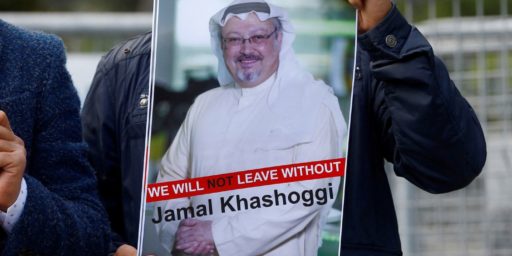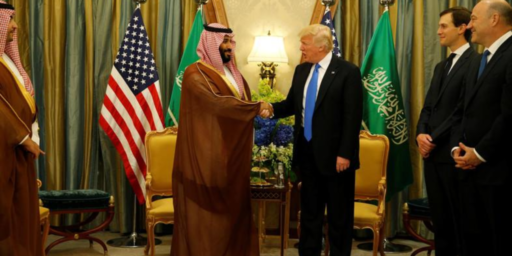Beyond Bin Laden
Arnaud de Borchgrave writes,
Al-Qaida is shorthand for a global politico-religious ideological movement. It draws much of its clientele from the same pool of poverty-stricken, forgotten men at the bottom of the economic pyramid that were attracted to communism during the Cold War. Destitute Muslims thrill to the exploits of suicide bombers. Thirty-one percent of Turks, in the same Pew survey, approve of suicide missions. The al-Qaida culture loves death as much as Westerners love life. Like KFC, al-Qaida is a franchise network, not for chicken, but for sympathetic extreme Islamist groups around the world.
The downtrodden, largely illiterate masses in Arab and other Muslim countries listen to their imams, mullahs and marabous. There are hundreds of millions of Muslims, from Morocco to Mindanao, who are ill served by their Muslim clergy, as the clerics are themselves poorly educated. Slogans about the Judeo-Christian crusade against Islam are eagerly embraced. They are told they are poor because of what the heathen Christians and Jews have stolen in their war to destroy Islam.
For them, Osama Bin Laden is a mythical hero much the way Che Guevara was to a previous generation of Third World revolutionaries.
The organization also enjoys the support of thousands of fundamentalist Muslims who work in major cities as lawyers, bankers, accountants, computer scientists and engineers. They have espoused the cause of militant Islam, much the way professionals joined communist parties in another era. They identify with the millions of jobless North African Muslims who live in slums on the outskirts of French cities and their South Asian counterparts in Britain.
Al-Qaida is not controlled or even directed by Osama bin Laden, as he flits from cave to hut to village mosque in the Hindu Kush mountain range that separates Afghanistan and Pakistan. Now that he knows satellite phone calls are GPS pinpointed by the National Security Agency, he has even less to say to his fanatical followers.
Since the battle of Tora Bora in December 2001, when bin Laden escaped into Pakistan with a security detail of some 50 Afghan Arabs, the Saudi terror master has gone to ground. Some 70,000 Pakistani soldiers and several thousand U.S. Special Forces have been chasing him up and down a 1,000-mile border of jagged mountains and deep, narrow ravines. Bin Laden captured dead or alive will have no visible impact on terrorist actions around the world. He will simply step out of mythology into martyrdom.
The Moroccan jihadis did not wait for word from bin Laden to detonate 10 bombs on commuter trains that killed 202 Spaniards and wounded 1,450 in Madrid train stations a week ago. Nor were they waiting for instructions on which safe house to use. There are scores of such al-Qaida terrorist cells all over Europe, the United States, North Africa, the Middle East, South Asia, Southeast Asia and sub-Sahara Africa.
The Saudis killed Khaled Ali Haj, a former bin Laden bodyguard, one of the 26 on their most wanted list. The kill was hailed in Saudi Arabia as a big breakthrough in the kingdom’s anti-terrorist campaign. But Riyadh has to worry about several thousand men trained in the arts of terrorist mayhem. During the war against the Soviet occupation of Afghanistan in the 1980s, some 30,000 Afghan Arabs, many of them Saudis, were trained by the Pakistan’s Inter-Services Intelligence agency before joining the Mujahideen in a hit-and-run guerrilla war. Another 30,000 jihadis from some 56 countries were trained in bin Laden’s Afghan camps during the 1990s.
Spain has changed al-Qaida’s calculus. Islamists around the world can see major and lasting political and strategic results for their cause. What the Soviet Union failed to achieve during 45 years of Cold War, al-Qaida did in three days — a key European ally was detached from an alliance built by an American president.
The Bush administration rejects any correlation between the grinding, sub-human poverty of large parts of the developing world and transnational terrorism. Its answer to Islamist extremism is a geostrategic vision of a democratized Middle East. But this does not begin to address the global crisis.
Contrary to the administration’s prediction that victory in Iraq would spawn a peaceful settlement in the Middle East, the occupation of Iraq has given al-Qaida a new lease on life following its defeat in Afghanistan. A new global vision, inspired by the architecture of the post-World War II European recovery program, is long overdue. The alternative is al-Qaida’s love of death machinations as far as anyone can peer over the parapet into the future.
I believe this accurately explains the scope of the problem. Contrary to the view of many, it goes well beyond Osama bin Laden.
While I’m very skeptical of the neo-conservative view that we’re going to bring democracy to the Middle East any time soon, I also think de Borchgrave’s answer is impractical. Exactly how would we replicate the Marshall Plan in the war on terrorism? Indeed, anything remotely similar to that plan would be hotly resisted as Western imperialism. Any serious program of economic revitalization is necessarily one of modernization which is, by definition, a violation of every tenet of Islamism.






The mis-understood nature of al Qaeda also demonstrates how “links to al Qaeda” is not like Hitler and Stalin signing a pacts, but a more ephemeral connection.
Enough with this “poverty breeds terrorists” garbage. Terrorists need money to train, buy supplies and travel. Without it, Atta and his boys would be loitering behind some Cairo mosque right now. Until we start taking out the people who bankroll this stuff, it will continue to flourish.
I give it a week before PeTA declares that likening al-Qaida to KFC is an insult – to al-Qaida.
I saw Arnaud de Borchgrave last night speaking on The 700 Club. He is an excellent commentator, leader, and a foreign policy expert; one of many American conservatives who opposed the Iraq war. He has been doing excellent commentary on issues regarding warfare and terrorism, and has also written a lot about Pakistan, which I’ve said before is a much greater threat to the world than Iraq ever was.
I like de Borchgrave and thought the column was good, although I may or may not disagree with his policy solution. (It’s too vague to judge.) I’m not sure his appearance on the 700 Club would help enhance my view of his ideas, though. 😉
—